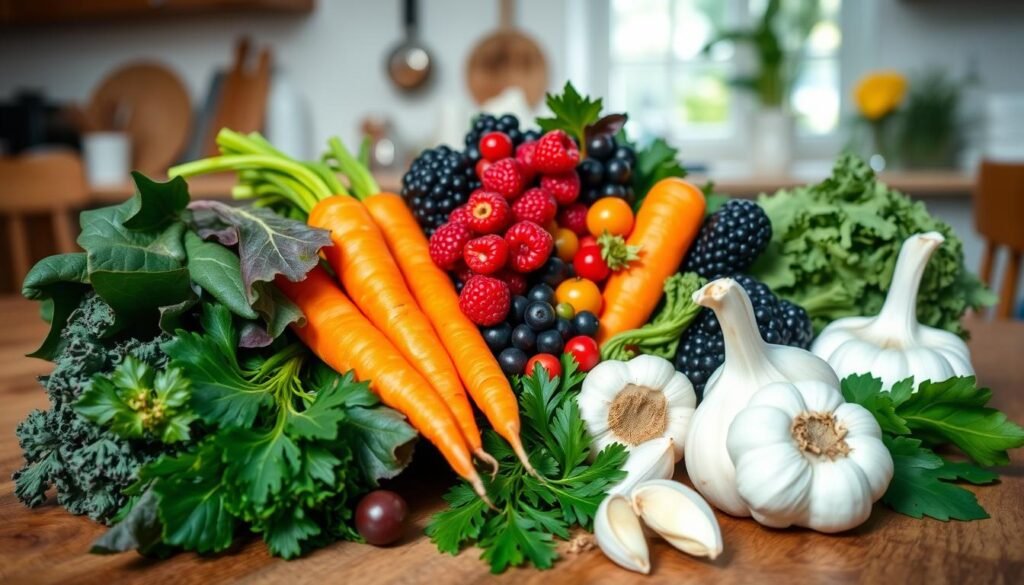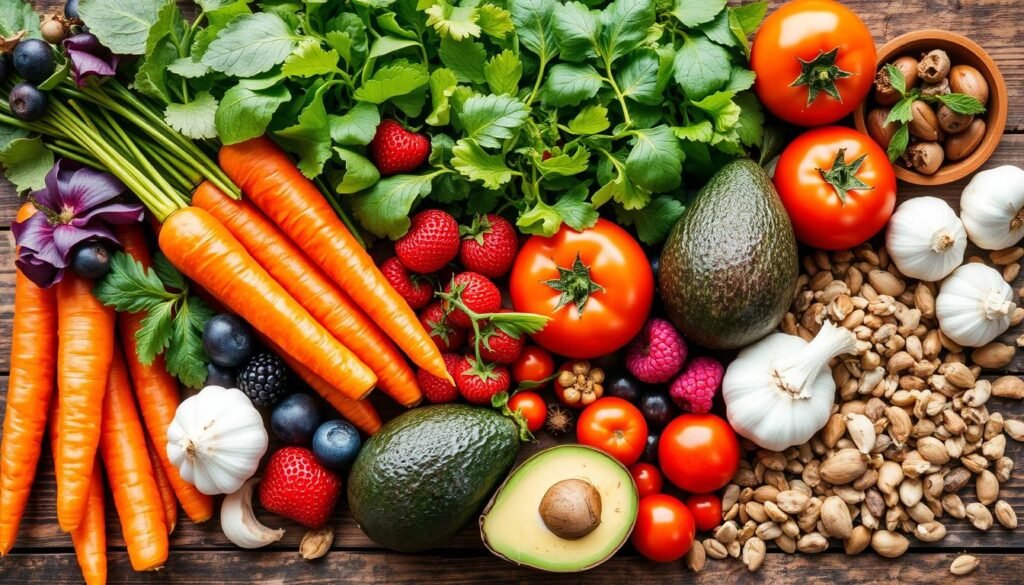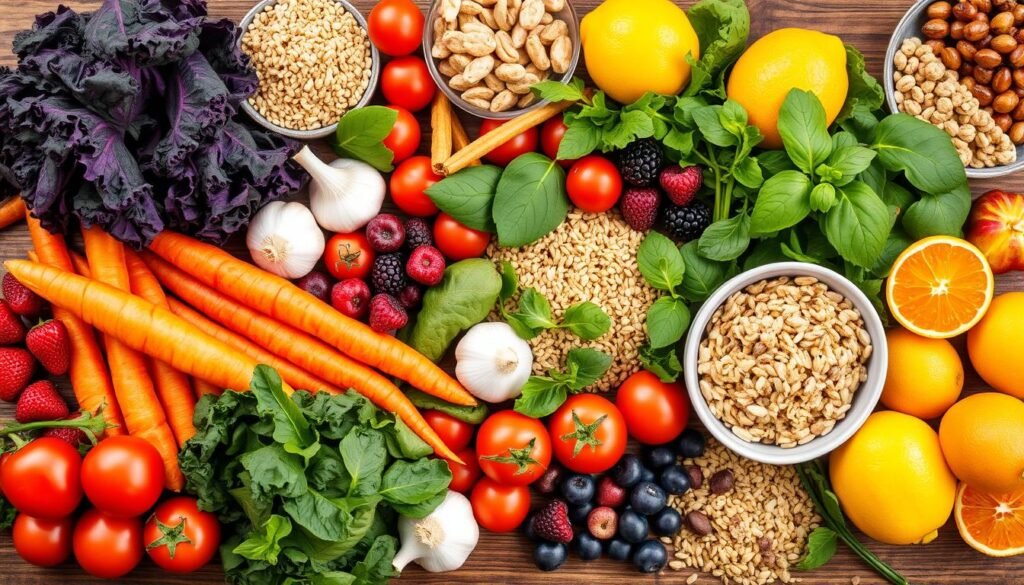About 1 in 16 people in the U.S. will face a lung cancer diagnosis. This fact shows how important it is to find ways to support health for those affected. Eating right plays a big part in this, helping with treatment and recovery.
Eating well when you have lung cancer is more than just keeping your weight up. It’s about giving your body what it needs to fight back. Focusing on foods packed with vitamins, minerals, and antioxidants can make a big difference. Let’s dive into how these nutrients can boost your diet during treatment.
Key Takeaways
- Lung cancer affects 1 in 16 Americans, underscoring the need for supportive nutrition.
- A balanced diet can positively influence treatment outcomes.
- Essential nutrients play a crucial role in boosting the immune system.
- Food choices can impact overall well-being during and after treatment.
- Specific vitamins and antioxidants are beneficial for lung health.
Understanding the Importance of Nutrition in Lung Cancer
Nutrition is very important for people with lung cancer. It can greatly change how well patients handle treatment. When going through chemotherapy and radiation, patients might face side effects. Eating right can ease these side effects, leading to easier recovery and stronger health.
Studies show that eating foods full of nutrients helps keep energy up and supports the immune system. People who focus on their diet often see fewer problems and enjoy a better life. The diet’s role in healing from lung is backed by lots of research. Many respected health groups underline the real gains from nutritional care in fighting cancer.
Eating a variety of healthy foods is key to good nutrition for lung cancer. Vitamins, minerals, and other nutrients fight oxidative stress and inflammation together. This approach makes diet a core part of lung cancer care, not just an add-on.
| Nutrient | Benefits | Food Sources |
|---|---|---|
| Vitamin C | Boosts immunity and aids in tissue repair | Citrus fruits, broccoli, strawberries |
| Omega-3 Fatty Acids | Reduces inflammation and enhances brain health | Fish, walnuts, flaxseeds |
| Fiber | Supports digestive health and helps maintain weight | Whole grains, beans, fruits |
| Antioxidants | Combat free radicals and reduce oxidative stress | Blueberries, dark chocolate, nuts |
Knowing how diet affects lung cancer recovery shows why eating well is crucial. Making smart food choices can make you stronger during and after treatment. It helps you take an active role in battling lung cancer.
What is a Lung Cancer-Friendly Diet?
A Lung Cancer-Friendly Diet focuses on whole, natural foods. These foods help the body stay strong and healthy. It is important for those with lung cancer to eat a diet rich in nutrients. This means balancing carbohydrates, proteins, and fats. Also, vitamins and minerals are essential for keeping the lungs well.
To eat well, patients should mix fruits, vegetables, whole grains, and lean proteins into their meals. They should avoid processed foods and sugars as much as possible. This approach helps support the body’s needs during lung cancer treatment.
Key components of this diet include:
- Fruits and Vegetables: They are packed with vitamins and antioxidants which fight off harmful oxidative stress.
- Whole Grains: They are a great source of energy and fiber, supporting a healthy diet.
- Lean Proteins: Essential for repairing body tissue and boosting the immune system. Good sources include chicken, fish, and legumes.
- Healthy Fats: Avocados and nuts are high in omega-3 fats, which are good for your health.
Research shows that eating habits should be tailored to each person’s health needs. A diet rich in nutrients can improve wellbeing and strength during lung cancer treatment. You can learn more about this through the nutrient-rich diet for lung cancer link.

Key Nutrients to Support Lung Health
Nutrients play a big part in keeping lungs healthy, especially with lung cancer. Vitamins and minerals help with immune function, fixing cells, and lowering inflammation. They are key for recovery and staying well. Including these nutrients in a diet can help a lot.
Vitamins and Minerals Essential for Lung Cancer Patients
Vitamins and minerals are crucial for lung health. Here are some important ones:
- Vitamin C: This vitamin fights inflammation and helps the immune system.
- Vitamin E: It’s important for cell health and better lung function.
- Selenium: A strong antioxidant that helps lungs fight stress.
- Zinc: It boosts immune health and helps fix cells. This is key for treatment.
Adding these vitamins can help lung cancer patients fight off illness and improve lung function. Eating whole foods that are rich in these nutrients helps the body deal with treatment better.
Role of Antioxidants in Fighting Cancer
Antioxidants are vital in fighting cancer. They reduce stressful damage linked to cancer. Eating foods rich in antioxidants is great for lung health. Foods to focus on include:
- Berries: They have lots of antioxidants that protect cells.
- Nuts: They offer healthy fats and antioxidants for good health.
- Green leafy vegetables: These are full of vitamins that fight inflammation and damage.
Studies show eating these foods helps lungs stay healthy. By focusing on antioxidants, people can improve their diets. This supports recovery and health.

Best Foods to Support Lung Cancer Treatment
Nutrition is key during lung cancer treatment. Adding the right foods to support lung cancer treatment helps recovery and well-being. Eating fruits, vegetables, and whole grains is crucial. They provide the nutrients needed for energy and better health.
Fruits and Vegetables That Boost Immunity
Fruits play a big role in lung health. They boost the immune system. Some top picks are:
- Citrus fruits like oranges and grapefruits
- Cruciferous vegetables such as broccoli and cauliflower
- Leafy greens like spinach and kale
These choices lower inflammation and improve health in cancer patients. Mixing different fruits and vegetables makes your diet healthier and more colorful.
Whole Grains for Energy and Fiber
Whole grains are vital for a lung cancer diet. They give you energy, vitamins, and fiber. Some good choices include:
- Brown rice
- Quinoa
- Whole grain bread
Foods rich in fiber support your digestive system. They also manage treatment side effects. Adding a variety of whole grains boosts your nutrition.

To learn more, explore resources on foods to support lung cancer treatment. These can help plan meals for a healthier lifestyle.
Superfoods for Lung Cancer: Top Picks
Including superfoods for lung cancer in your daily meals can boost your health. These foods for lung cancer come with many antioxidants. Such elements are good for your lungs. Let’s look at some top options.
- Turmeric: This bright yellow spice has strong anti-inflammatory qualities. Its main component, curcumin, could help battle lung cancer cells.
- Ginger: Ginger, full of antioxidants, can fight off inflammation. It’s a great choice for adding to food.
- Garlic: Garlic has properties that can fight cancer and boost the immune system. It also adds great flavor.
- Blueberries: Packed with vitamins C and K, blueberries help keep your lungs healthy.
Eating these nutrient-rich foods for lung cancer can improve lung performance and your overall health. For more about these superfoods, check out this detailed guide on superfoods.
| Superfood | Benefits | Nutritional Highlights |
|---|---|---|
| Turmeric | Anti-inflammatory, may inhibit cancer cell growth | High in curcumin |
| Ginger | Reduces inflammation, boosts immunity | Rich in gingerol |
| Garlic | Enhances immune function, combats cancer | Contains allicin |
| Blueberries | Supports lung function, rich in vitamins | High in antioxidants |
Adding these superfoods to your diet is an easy way to boost lung health, especially with lung cancer. Making these foods a part of your diet is a key move for better health.
Incorporating an Anti-Inflammatory Diet for Lung Cancer
An anti-inflammatory diet for lung cancer means eating foods that reduce body inflammation. This diet supports lung health and overall well-being. It brings lots of nutrients that help with treatment and fight cancer symptoms.
Foods That Reduce Inflammation
Eating anti-inflammatory foods helps lung cancer patients. Key choices include:
- Fatty fish: Salmon and mackerel have omega-3s, which fight inflammation.
- Nuts and seeds: Walnuts and flaxseeds have fats that may lower inflammation.
- Olive oil: Extra virgin olive oil has antioxidants that tackle inflammation.
- Fruits and vegetables: Berries, greens, and veggies like broccoli fight inflammation with vitamins and minerals.
Herbs and Spices That Aid in Healing
Adding specific herbs and spices boosts an anti-inflammatory diet for lung cancer. These include:
- Turmeric: It contains curcumin, a strong anti-inflammatory.
- Basil: Known for antioxidants, it helps lower inflammation.
- Ginger: Helps with nausea and fights inflammation.
Creating a Lung Cancer Meal Plan
Creating a lung cancer meal plan means thinking carefully about nutrition to boost health. Eating well is key for lung cancer patients. It can lead to better results from treatment and a higher quality of life. Keep the following tips in mind when making a meal plan:
- Incorporate a variety of foods to ensure a balanced intake of essential nutrients.
- Plan meals around the primary food groups: proteins, whole grains, fruits, and vegetables.
- Prepare meals in advance to make healthy choices more accessible during busy days.
- Include regular meal times to maintain energy levels and enhance metabolism.
- Stay hydrated by drinking plenty of water throughout the day, aiming for at least eight cups.
| Day | Breakfast | Lunch | Dinner | Snacks |
|---|---|---|---|---|
| Monday | Oatmeal with berries | Grilled chicken salad | Quinoa with vegetables | Carrot sticks and hummus |
| Tuesday | Greek yogurt with honey | Whole grain wrap with turkey | Stir-fried tofu and broccoli | Apple slices and almond butter |
| Wednesday | Scrambled eggs with spinach | Lentil soup with whole grain bread | Salmon with brown rice | Mixed nuts |
Following these steps helps create a nutritious lung cancer meal plan. Eating healthy lets lung cancer patients boost their nutrient intake. It also gives them a way to feel in control during their treatment.
Lung Cancer-Friendly Diet: Foods to Avoid
Maintaining a healthy diet is very important for people with lung cancer. Certain unhealthy foods for cancer patients can make symptoms worse or affect treatment. Foods to steer clear of include:
- Processed foods – These have additives and lots of salt, which can cause inflammation.
- Red and processed meats – Eating these might increase cancer risks. They’re not good for lung cancer patients.
- Excessive sugar – Too much sugar can weaken the immune system and cause inflammation.
- Greasy and fried foods – These foods can upset your stomach and impact your health.
- Spicy foods – These might upset the stomach during treatment.
- Raw or undercooked items – These can have bacteria, which is risky for weakened immune systems.
- Unpasteurized dairy products – Like raw foods, these can also carry harmful bacteria.
Choosing the right foods is key for lung cancer patients’ treatment journey. Talking to health experts or nutritionists is crucial to understand foods to avoid in lung cancer. Knowing what foods to avoid helps in improving health during treatment.
Knowing what not to eat helps patients focus on their health. Making smart food choices supports a better treatment process. For more information on what to eat, there are resources available. These include strategies on maintaining a diet that’s good for lung cancer, such as foods to limit or leave out, based on lung health nutrition studies.
Conclusion
Adopting a Lung Cancer-Friendly Diet is key for those undergoing lung cancer treatment. It focuses on key vitamins, minerals, and antioxidants. It also stresses the need for whole foods like fruits, veggies, and whole grains. Including these foods can boost lung cancer nutrition, possibly bettering health and well-being during treatment.
It’s vital for patients and their caregivers to consult with healthcare pros and dieticians. Creating a nutrition plan that meets individual needs is important. Such a plan can aid in recovery and help manage health effectively.
A balanced diet, rich in foods that fight inflammation and boost the immune system, can improve health outcomes. It brings hope and energy to those on their cancer journey. Good lung cancer nutrition is essential for maintaining a high quality of life.